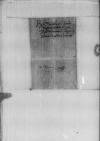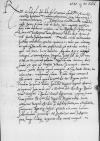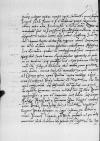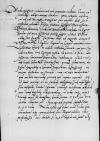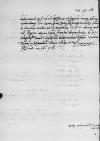Familiaris meus ⌊Borowski⌋ reddidit mihi Reverendissimae Paternitatis Vestrae ⌊⌋ de data XVI Augusti, quibus scire a me desiderat causam, cur ⌊dominus Posnaniensis⌋, filius meus, ⌊Litwaniam⌋ proficiscens eam praeterierit nulla de se Reverendissimae Paternitati Vestrae facta significatione. Nulla animi contrarietate factum arbitrare apud se Reverendissima Paternitas Vestra velit nec alicuius rei gratia, quam suae celerrimae profectionis, q(ua)m interdiu noctuque egit, nec somno locus dabatur. Atque ideo Reverendissima Paternitas Vestra integra integra et amoris plena singula potest sibi de filio meo et me certo certius polliceri. Nunc iterum decima dies hodie est, quo ipse vicissim ⌊Vilnam⌋ se recepit, dumtaxat XVIII diebus apud coniugem et me on the margin⌈meme on the margin⌉ ex tanto itinere immoratus, redditurus rationem sacrae ⌊maiestati regiae⌋ muneris sibi iniuncti, quid apud serenissimum dominum ⌊Romanorum regem⌋, primo tandem serenissimam dominam ⌊Izabellam Ungariae reginam⌋ effecerit, aliquoties hincinde, nunc a serenissimo domino Romanorum rege ⌊Budam⌋, nunc vicissim e Buda ⌊Viennam⌋ discurrens, cupiens servire, cum primo serenissimae dominae Ungariae reginae rebus, tum maxime reipublicae Christianae, si Dominus Deus facta sua et instituta prosperare dignatus fuisset.
Quanta autem cura, labore, sollicitudine, periculis, tum hostium, tum aurae pestiferae, quae longe lateque regiones illas omnes occupat, in  BCz, 1599, p. 44 quibus integrae septem menses egit, subierit, quot sumptus fecerit, facile secum Reverendissima Paternitas Vestra iudicare potest. Quoniam autem inter alia hoc etiam sibi a sacra ⌊maiestate regia⌋ demandatum fuit, ut si potissimum ⌊Turcarum imperatorem⌋ venire contigerit, oratorio nomine illum adiret eiusdemque serenissimae dominae ⌊Ungariae reginae⌋ et ⌊eius filii⌋ negotia obiret, cui quidem rei in eo iam summo rerum discrimine, quo et aura pestifera loca illa omnia, quibus illi pertranseundum fuit, occuparat. Cum written over ...⌈... illegible⌈...... illegible⌉CumCum written over ...⌉(?) etiam tanta viarum et pertransitus insecuritas, utpote in ea provincia, cui quodlibet, licet et qui potentior viribus, nulli rationi, statui et condicioni, etiam contra iura gentium, ratio datur, munus tamen sibi iniunctum exsequi curavit et ⌊caesarem⌋ ipsum apud ⌊Budam⌋ castra metatum adiit. Nam tam insperate ⌊Budam⌋ advenit, ut serenissimus dominus ⌊Romanorum rex⌋, apud cuius maiestatem ⌊dominus Posnaniensis⌋ tunc agebat, non prius de adventu ⌊Turcarum⌋ certior redditus fuit, quam Turcae Budam applicuissent, a quo, ut temporum fert condicio, satis benigne habitus.
BCz, 1599, p. 44 quibus integrae septem menses egit, subierit, quot sumptus fecerit, facile secum Reverendissima Paternitas Vestra iudicare potest. Quoniam autem inter alia hoc etiam sibi a sacra ⌊maiestate regia⌋ demandatum fuit, ut si potissimum ⌊Turcarum imperatorem⌋ venire contigerit, oratorio nomine illum adiret eiusdemque serenissimae dominae ⌊Ungariae reginae⌋ et ⌊eius filii⌋ negotia obiret, cui quidem rei in eo iam summo rerum discrimine, quo et aura pestifera loca illa omnia, quibus illi pertranseundum fuit, occuparat. Cum written over ...⌈... illegible⌈...... illegible⌉CumCum written over ...⌉(?) etiam tanta viarum et pertransitus insecuritas, utpote in ea provincia, cui quodlibet, licet et qui potentior viribus, nulli rationi, statui et condicioni, etiam contra iura gentium, ratio datur, munus tamen sibi iniunctum exsequi curavit et ⌊caesarem⌋ ipsum apud ⌊Budam⌋ castra metatum adiit. Nam tam insperate ⌊Budam⌋ advenit, ut serenissimus dominus ⌊Romanorum rex⌋, apud cuius maiestatem ⌊dominus Posnaniensis⌋ tunc agebat, non prius de adventu ⌊Turcarum⌋ certior redditus fuit, quam Turcae Budam applicuissent, a quo, ut temporum fert condicio, satis benigne habitus.
Priusquam autem a ⌊Turcarum caesare⌋ venisset, iam, proh dolor, ⌊Buda⌋ Turca potitus fuit et serenissimam dominam ⌊Ungariae reginam⌋ Buda discedere in ⌊Lippam⌋ castrum sui dotalicii voluit.
Proceres ⌊Ungariae⌋, qui ⌊Buda⌋ profuerint et qui multis rationibus flecti et induci non potuerint, ut serenissimo domino ⌊Romanorum regi⌋  BCz, 1599, p. 49 Buda cessissent, maluerunt contra omnem rationem ⌊Turcae⌋ eam servare et per manus tradere. ⌊Qua⌋ accepta eosdem, cum ad ⌊eum⌋ in castra venissent, per aliquot dies sub custodia retinuit.
BCz, 1599, p. 49 Buda cessissent, maluerunt contra omnem rationem ⌊Turcae⌋ eam servare et per manus tradere. ⌊Qua⌋ accepta eosdem, cum ad ⌊eum⌋ in castra venissent, per aliquot dies sub custodia retinuit.
Postea fratrem ⌊Georgium Monachum⌋, ⌊Petrum Petrovicz⌋, ⌊Verbecium⌋ cancellarium, cum iam integrio(!) ⌊Buda⌋, tum arce, quam civitate potitus fuisset et tres ecclesias ritui suo dicasset, tum primo illos ab exercitu dimisit, ut serenissimam dominam ⌊Ungariae reginam⌋ in ⌊Lippam⌋ comitarentur, ⌊Valentino Turek⌋ in eadem custodia servato. ⌊Qui⌋ pro sui liberatione tria egregia castra non procul a ⌊Buda⌋ consistentia ⌊Turcarum imperatori⌋ daturum se obtulerat, non tamen libertate donatus fuit.
Quoad ⌊filius meus⌋, dominus Posnaniensis, expeditus a ⌊Turcarum imperatore⌋ discesserat, in priori custodia ⌊eo⌋ servato, iam res ipsa indicavit,
quin or cum⌈quinquin or cum⌉
merite mercedis praemia ipsi capere ceperunt, qui non sanis consiliis et rei Christianae utilissimis, sed infandissimo suo instituto tantum discrimen universae rei Christianae attulerunt. Quo, quid dispendii reliquis omnibus, cum nobis, tumque aliis vicinis, mali sit commissum, faci(li)t(e)r secum Reverendissima Paternitas Vestra sua prudentia dimetiri potest. Haec ego ad praesens significare Reverendissimae Paternitati Vestrae volui.
Non spero ego ⌊filium meum⌋ ⌊Vilnae⌋ diu immoraturum atque, quemadmodum per ⌊Regium Montem⌋ illuc profectus sit, nec dubito, si Reverendissima Paternitas Vestra desiderium suum illi  BCz, 1599, p. 50 declaraverit, quod sit ad eam descensurus et singula coram uberius declaraturus. Dominus Czema, comes huius, suae perigrinationis planius de periculis omnibus, tum de sumptibus, Reverendissimam Paternitatem Vestram edoceri poterit.
BCz, 1599, p. 50 declaraverit, quod sit ad eam descensurus et singula coram uberius declaraturus. Dominus Czema, comes huius, suae perigrinationis planius de periculis omnibus, tum de sumptibus, Reverendissimam Paternitatem Vestram edoceri poterit.
Ego me interea favori et mutuae benevolentiae Reverendissimae Paternitatis Vestrae diligentissime commendo, cupiens illam dudum incolum<em> et felicem valere.
 BCz, 1599, p. 44 quibus integrae septem menses egit, subierit, quot sumptus fecerit, facile secum Reverendissima Paternitas Vestra iudicare potest. Quoniam autem inter alia hoc etiam sibi a sacra
BCz, 1599, p. 44 quibus integrae septem menses egit, subierit, quot sumptus fecerit, facile secum Reverendissima Paternitas Vestra iudicare potest. Quoniam autem inter alia hoc etiam sibi a sacra  BCz, 1599, p. 49 Buda cessissent, maluerunt contra omnem rationem
BCz, 1599, p. 49 Buda cessissent, maluerunt contra omnem rationem  BCz, 1599, p. 50 declaraverit, quod sit ad eam descensurus et singula coram uberius declaraturus. Dominus Czema, comes huius, suae perigrinationis planius de periculis omnibus, tum de sumptibus, Reverendissimam Paternitatem Vestram edoceri poterit.
BCz, 1599, p. 50 declaraverit, quod sit ad eam descensurus et singula coram uberius declaraturus. Dominus Czema, comes huius, suae perigrinationis planius de periculis omnibus, tum de sumptibus, Reverendissimam Paternitatem Vestram edoceri poterit.